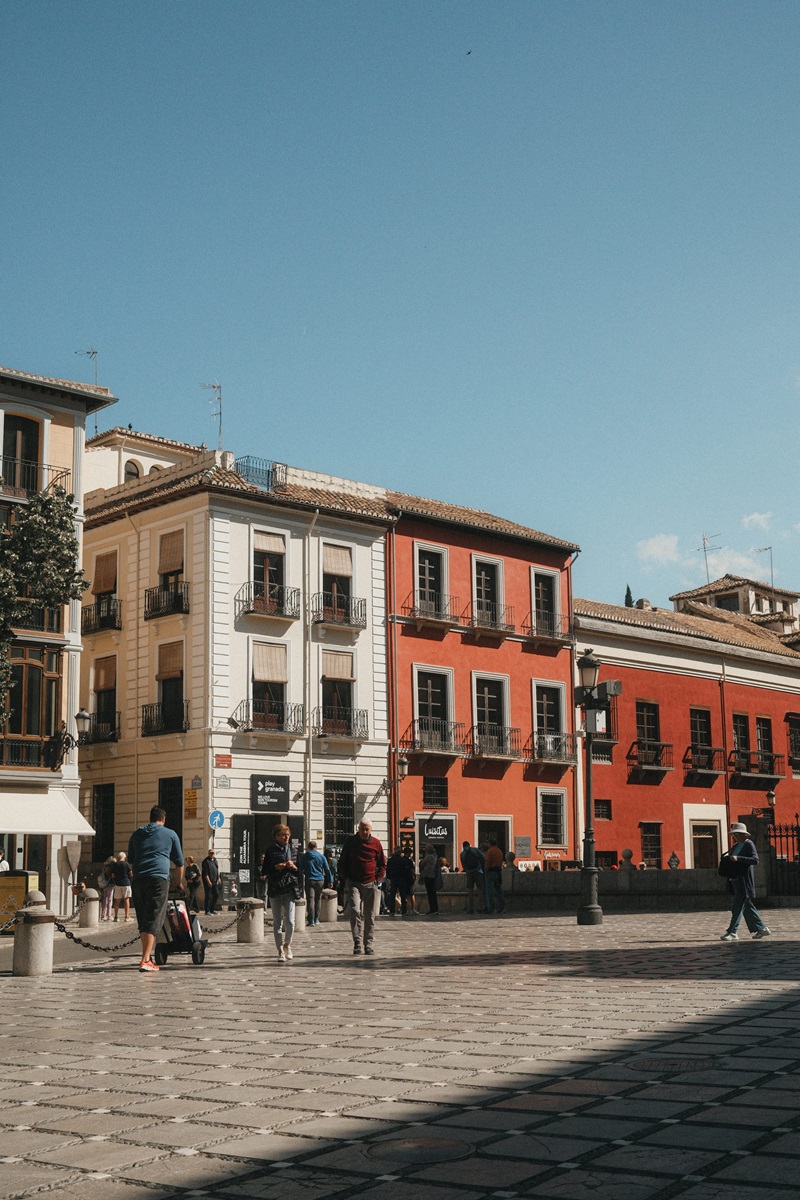LIFESTYLE
Best locations to live in Spain for expats

Spain is a diverse and vibrant country that offers a variety of locations for expats to live in. From the bustling cities of Madrid and Barcelona to the picturesque coastal towns of Malaga and Valencia, there is something for everyone. Each region of Spain has its own unique culture, cuisine, and lifestyle, so expats can easily find a place that suits their preferences. Whether you’re interested in living in a historic city center, a laid-back beach town, or a bustling metropolis, Spain has it all. One of the main attractions of living in Spain as an expat is the country’s warm climate and beautiful scenery. The Mediterranean coast, known for its sandy beaches and crystal-clear waters, is a popular choice for expats looking to soak up the sun and enjoy a relaxed lifestyle. Additionally, Spain’s rich history and cultural heritage can be seen in its charming villages, stunning architecture, and vibrant festivals. For example, the city of Seville is famous for its flamenco dancing and historic landmarks, while the region of Galicia is known for its Celtic heritage and lush green landscapes. Overall, Spain offers expats a diverse and welcoming environment to call home.
Cost of Living in Spain

When it comes to the cost of living in Spain, it can vary depending on which part of the country you choose to live in. Larger cities like Madrid and Barcelona tend to have higher costs for rent, groceries, and dining out, while smaller cities and rural areas are generally more affordable. For example, a one-bedroom apartment in the center of Madrid can cost around €2,000 per month, compared to a similar apartment in a smaller city like Valencia, where the rent might be closer to €600. In addition to rent, other factors that can impact the cost of living in Spain include healthcare, transportation, and entertainment. Healthcare in Spain is known for its high quality and affordable prices, with many expats choosing to take advantage of the country’s public healthcare system. Meanwhile, public transportation is efficient and reasonably priced, making it easy to get around without owning a car. As for entertainment, Spain offers a wide range of options, from free outdoor activities like hiking and beach days to more expensive options like concerts and theater tickets.
Climate and Weather in Spain
Regarding climate and weather in Spain, you can expect a wide range of conditions depending on where you choose to live. Spain is generally known for its warm Mediterranean climate, with hot summers and mild winters. For example, cities like Barcelona and Valencia enjoy long hours of sunshine throughout the year, making them ideal locations for those seeking a warm and sunny climate. On the other hand, cities like Madrid and Bilbao experience more extreme temperature variations, with hot summers and cold winters. Suppose you prefer a more temperate climate with less humidity. In that case, you might want to consider living in the northern regions of Spain, such as Galicia or Asturias, where the weather is cooler and more moderate. It’s important to keep in mind that Spain’s climate can vary significantly from region to region, so it’s essential to research the specific weather patterns of the area you’re considering moving to. For example, the Canary Islands off the coast of Africa have a subtropical climate with warm temperatures year-round, while the mountainous regions of the Pyrenees and Sierra Nevada can experience heavy snowfall during the winter months. Additionally, the Mediterranean coast is prone to hot winds called “siroccos,” which can bring high temperatures and dry conditions during the summer. Overall, Spain offers a diverse range of climates to suit every preference, so whether you prefer sunny beaches or snowy mountains, you’re sure to find a location that fits your ideal weather conditions.
Healthcare System in Spain
The healthcare system in Spain is one of the best in the world, which is great news for expats looking to move to the country. The system is universal, meaning that everyone has access to healthcare regardless of their income or status. The quality of care is top-notch, with modern facilities and well-trained professionals. For example, Spain has a high number of doctors per capita compared to other countries, ensuring that patients receive prompt and personalized care. Additionally, prescription medications are often heavily subsidized, making them affordable for patients. Another great aspect of the healthcare system in Spain is the ease of access for expats. Many doctors and healthcare professionals speak English, so language barriers are not a major issue. Additionally, expats with residency in Spain can access the public healthcare system, which provides comprehensive coverage for a range of medical services. For example, routine check-ups, specialist appointments, and emergency care are all covered under the public system. Overall, the healthcare system in Spain provides expats with peace of mind knowing that they will receive quality care when needed.
Housing Options in Spain
When it comes to housing options in Spain, you have plenty to choose from. Whether you’re looking for a busy city apartment, a quaint village house, or a beachfront villa, Spain has it all. In big cities like Madrid and Barcelona, you’ll find high-rise apartments and sleek modern condos in the city center, perfect for those who want to be in the heart of the action. If you prefer a more relaxed lifestyle, consider smaller towns and villages where traditional Spanish homes with charming courtyards and terraces are common. And if you dream of living by the sea, look no further than the Costa del Sol or Costa Brava, where you can find stunning beachfront properties with unbeatable views. Keep in mind that rental prices and property values can vary drastically depending on the location in Spain. While big cities and popular tourist destinations like Marbella or Ibiza can be quite expensive, smaller towns and villages offer more affordable housing options. For example, a two-bedroom apartment in the center of Madrid can cost you more than double compared to a similar property in a smaller town like Valencia. Whether you choose to rent or buy, make sure to research the local housing market and consider your budget before making a decision. And don’t forget about additional costs like utility bills, property taxes, and homeowners association fees, which can add up quickly.
Transportation in Spain
Transportation in Spain is pretty top-notch. You’ve got the high-speed trains, like the AVE, that can get you from Madrid to Barcelona in just a few hours. And if you’re a fan of the big cities, you’ll appreciate the extensive metro systems in places like Madrid and Barcelona. They’re clean, and efficient, and can get you just about anywhere you need to go. And if you prefer the open road, the highways in Spain are well-maintained and easy to navigate. Plus, there are plenty of affordable options for renting cars or taking buses to explore the countryside. But don’t sleep on the public transportation in the smaller towns and villages either. You can hop on a local train or bus to get around, or even rent a bike to explore at your own pace. And if you’re looking to travel between islands, there are ferries and even flights available to get you where you need to go. Overall, transportation in Spain is a breeze, whether you’re navigating the bustling streets of a big city or taking in the scenic views of the countryside.
Education System in Spain
The education system in Spain is divided into different stages, starting with pre-primary education, followed by primary, secondary, and higher education. One unique aspect of the system is that education is compulsory for children between the ages of 6 and 16. After completing primary education, students can choose between vocational training or continuing with secondary education, culminating in the Bachillerato, which is akin to the High School diploma in the United States. In terms of higher education, Spain boasts prestigious universities, such as the Universidad Complutense de Madrid and the University of Barcelona, known for their quality education and research opportunities. Another interesting feature of the Spanish education system is the emphasis on language learning. In addition to Spanish, students are required to learn a second language, usually English, French, or German. This focus on language acquisition can be highly beneficial for expats looking to settle in Spain, as it facilitates communication and integration into the local community. Furthermore, the country offers a wide range of international schools that cater to the needs of expat families by providing education in different languages, such as English or German, alongside the Spanish curriculum. This diversity in educational options makes Spain an attractive destination for expats looking to raise children in a multicultural environment while ensuring a high-quality education.
Entertainment and Leisure Activities in Spain
When it comes to entertainment and leisure activities in Spain, you’ll never be bored. From the vibrant nightlife in cities like Barcelona and Madrid to the picturesque beaches along the Mediterranean coast, there’s something for everyone. For those who enjoy outdoor activities, Spain offers world-class hiking and cycling trails in the Sierra Nevada mountains and the Pyrenees. If you’re a foodie, you can indulge in delicious tapas and paella at local markets or Michelin-starred restaurants. And for those who love culture, you can explore historic cities like Granada and Seville with their stunning Moorish architecture and vibrant flamenco performances. One unique leisure activity in Spain is attending a bullfighting event. While it may not be for everyone, it is a significant part of Spanish culture. You can also partake in traditional festivals such as La Tomatina in Buñol, where participants throw tomatoes at each other in a fun and messy celebration. For those who prefer a more relaxed atmosphere, you can spend the day at a spa in one of the many thermal towns like Caldes de Malavella. Overall, there’s never a dull moment in Spain when it comes to entertainment and leisure activities.
Safety and Security in Spain
Safety and security in Spain is generally good, especially in popular expat destinations like Barcelona and Valencia. The country has low crime rates compared to other European countries, making it a safe place to live for expats. Police presence is visible in most cities, and emergency help is easily accessible if needed. Expats living in Spain can feel comfortable walking around their neighborhoods at night and using public transportation without much worry. In addition to low levels of crime, Spain also has a strong healthcare system that provides quality medical care to residents and expats alike. The country boasts modern hospitals and clinics equipped with state-of-the-art technology and staffed with skilled medical professionals. Expats in Spain can have peace of mind knowing that they have access to excellent healthcare services in case of any emergencies. Overall, the combination of good safety and security measures, along with a reliable healthcare system, makes Spain a great choice for expats looking to live abroad.
Best Locations to Live in Spain

When it comes to the best locations to live in Spain for expats, there are a few stand-out options that offer a great combination of amenities, affordability, and quality of life. One top pick is Barcelona, a vibrant city known for its stunning architecture, delicious cuisine, and lively nightlife. With its world-class museums, beautiful beaches, and excellent public transportation system, Barcelona has something to offer for everyone. Additionally, Valencia is another popular choice for expats looking to live in Spain. This coastal city boasts a Mediterranean climate, stunning beaches, and a thriving cultural scene. With its affordable cost of living and abundance of international schools, Valencia is a great option for families looking to relocate to Spain. Another fantastic location for expats in Spain is Madrid, the bustling capital city known for its rich history, world-class shopping, and unbeatable nightlife. With its diverse neighborhoods, top-notch healthcare system, and convenient public transportation, Madrid has become a top choice for expats looking to live in Spain. Additionally, Seville is a charming city in the south of Spain that offers a slower pace of life, beautiful architecture, and a rich cultural heritage. With its warm weather, delicious food, and low cost of living, Seville is a popular destination for expats looking to experience authentic Spanish culture.

-

 ENTERTAINMENT3 months ago
ENTERTAINMENT3 months agoBuilding Community Through Compassion: The Social Mission Behind Big Yard’s Music
-

 GUIDE2 months ago
GUIDE2 months agoBenefits of Air Casters for Safe and Efficient Material Handling
-

 HOME IMPROVEMENT1 month ago
HOME IMPROVEMENT1 month agoWall Panels: Transforming Spaces with Style and Functionality
-

 GUIDE1 month ago
GUIDE1 month agoBuild to Suit Opportunities Offer Turnkey Locations for Retail Business
